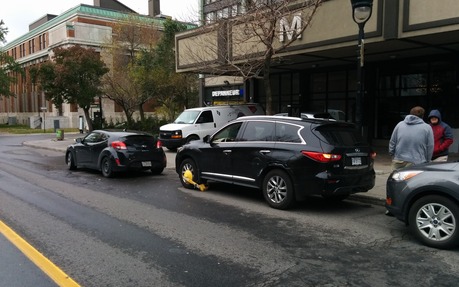Private Sector Use Of Automated License Plate Scanners - What's Legal In Quebec?
The technology used to invade the privacy of motorists is advancing at a rapid rate, and automated license plate scanners are at the bleeding edge of what's legal under Canadian and provincial law. These devices track the license plate numbers of every vehicle on the road ahead - parked or moving - and compare them to a database in order to identify stolen vehicles, vehicles with unpaid registration fees, or vehicles associated with a crime.
In Quebec, automated license plate scanners have been used by law enforcement for a number of years, with Montreal police initiating a pilot program in 2011. The controversy surrounding these scanners is a nuanced one - since the plates being scanned are parked or driving in a public place, supporters of the program say that it's the equivalent of an officer seeing the plate with his or her own eyes. Critics claim, however, that the automated gathering and comparison of plate information in a database constitutes an illegal search, given that there is no probable cause associated with linking a given plate with an infraction. There's also concern that the data that is warehoused by the scanning system could be used to track the movements of specific vehicles, an activity which is illegal without a warrant.
- Also: Ontario Driver Pulled Over with Cardboard Licence Plate
- Also: Ontario Scraps Licence Plate stickers, Renewal Fees
I've been following the plate scanner saga for a number of years, which is why the scene I came across today on Monkland avenue in Montreal's NDG neighbourhood caught me by surprise. An Infiniti JX was parked and booted on the side of the road, with two cars boxing it in - each of which had plate scanners attached to the roof or hood, linked to laptops mounted on the dashboard. I later confirmed with a security sector professional that these were indeed plate scanners. A woman was in the Infiniti speaking to two men, who were the drivers of the scanner-equipped vehicles.
An unusual scene to say the least, and one that got weirder when I was asked to stop taking photos by a man who would not identify himself, but who was clearly not linked to the city or law enforcement. When I asked questions about the scanners, and asked him who he worked for, he told me he was not able to discuss it. A second man, also in casual dress, asked me again to step away from the vehicles, at which point I reminded him that we were in a public place, that I was a journalist, and that taking photos was well within the bounds of the law.
Here's my question: are these plate scanners being operated by a private company, and if so, is this legal, and what laws regulate the data that is being collected? Specifically, I am curious as to how that data is being used, and how long it is stored. Also, how does it relate to the vehicle with a traffic boot on it? I saw some paperwork in the hand of one of the men who spoke with me that had the AVIS rental car logo prominently displayed. Is AVIS using plate scanning technology to repossess vehicles that have been kept past their contract period? If so, how common is this technology in the private sector in Quebec?
I've had a lot of trouble finding any legislation linked to private use of automated plate scanning technology in Quebec. Please contact me here at The Car Guide if you have any information regarding this subject that could help us get a clear picture of what was happening on the street this afternoon.
